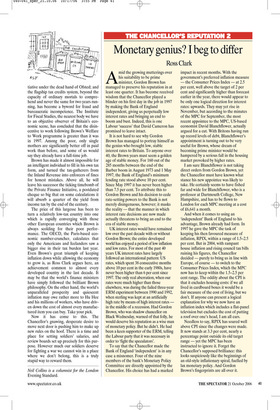Monetary genius? I beg to differ
Ross Clark
Amid the growing mutterings over his suitability to be prime minister, Gordon Brown has managed to preserve his reputation in at least one quarter. It has become received wisdom that the Chancellor played a blinder on his first day in the job in 1997 by making the Bank of England independent, giving us perpetually low interest rates and bringing an end to boom and bust. Indeed, this is one Labour ‘success’ that David Cameron has promised to leave intact.
It is not hard to see why Gordon Brown has managed to portray himself as the genius who brought low, stable interest rates to Britain. To anyone over 40, the Brown years must seem a golden age of stable money. For 160 out of the 285 months between the end of the Barber boom in August 1973 and 1 May 1997, the Bank of England’s minimum lending rate stood above 10 per cent. Since May 1997 it has never been higher than 7.5 per cent. To attribute this to Gordon Brown and his decision to cede rate-setting powers to the Bank is not merely disingenuous, however; it masks the reality — that the manner in which interest rate decisions are now made actually threatens to bring an end to the era of stable money.
UK interest rates would have remained low over the past decade with or without Gordon Brown; the entire developed world has enjoyed a period of low inflation and low rates. For most of the past 40 years UK interest rates have largely followed an international pattern: US rates, which spent 38 consecutive months above 10 per cent in the early 1980s, have never been higher than 6 per cent since 1997. The only real aberration, when our rates were much higher than those elsewhere, was during the failed three-year ERM experiment between 1990 and 1992, when sterling was kept at an artificially high rate by means of high interest rates in the middle of a recession. Had Gordon Brown, who was shadow chancellor on Black Wednesday, warned of that folly, he would deserve his reputation as a wise man of monetary policy. But he didn’t. He had been a keen supporter of the ERM, telling the Labour party that it was necessary in order to ‘fight the speculators’.
To say that the Chancellor made the Bank of England ‘independent’ is in any case a misnomer. Four of the nine members of the bank’s Monetary Policy Committee are directly appointed by the Chancellor. His choice has had a marked impact in recent months. With the government’s preferred inflation measure — the Consumer Prices Index — at 2.5 per cent, well above the target of 2 per cent and significantly higher than forecast earlier in the year, there would appear to be only one logical direction for interest rates: upwards. They may yet rise in November, but according to the minutes of the MPC for September, the most recent appointee to the MPC, US-based economist David Blanchflower, actually argued for a cut. With Britons having run up record levels of debt, Blanchflower’s appointment is turning out to be very useful for Brown, whose dream of becoming prime minister would be hampered by a serious fall in the housing market provoked by higher rates.
I am sure Blanchflower is not taking direct orders from Gordon Brown, yet the Chancellor must have known what stance his new appointee was likely to take. He certainly seems to have fished far and wide for Blanchflower, who is a professor at Dartmouth College, New Hampshire, and has to be flown to London for each MPC meeting at a cost of £6,641 a month.
And when it comes to using an ‘independent’ Bank of England to his advantage, Brown already had form. In 1997 he gave the MPC the task of keeping his then favoured measure of inflation, RPIX, within a range of 1.5–2.5 per cent. But in 2004, with rampant house inflation and rising council tax bills ruining his figures, the Chancellor decided — purely to bring us in line with Europe, of course — to switch to the Consumer Prices Index, which the MPC now has to keep within the 1.5–2.5 per cent range. The oddity about the CPI is that it excludes housing costs: if we all lived in cardboard boxes it would be a fair measure of the cost of living, but we don’t. If anyone can present a logical explanation for why we now have an inflation index which includes a flat-panel television but excludes the cost of putting a roof over one’s head, I am all ears.
Needless to say, RPIX has soared well above CPI since the changes were made. It now stands at 3.3 per cent, nearly a percentage point outside its old target range — yet the MPC has been instructed to ignore it. Forget the Chancellor’s supposed brilliance: this looks suspiciously like the beginnings of an old-style inflationary spiral, fuelled by lax monetary policy. And Gordon Brown’s fingerprints are all over it.


































































































 Previous page
Previous page